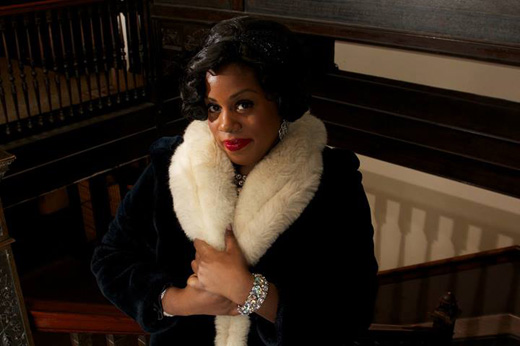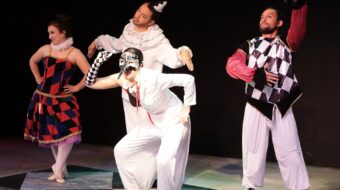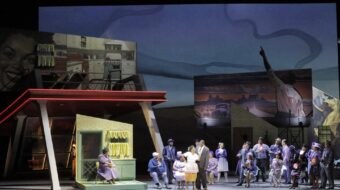
Tunes by Duke Ellington (1899-1974), such as “It Don’t Mean a Thing if It Ain’t Got That Swing,” “Sophisticated Lady,” “Do Nothing Til You Hear From Me,” “Solitude,” “Mood Indigo,” and “Satin Doll” have long been fixtures of the American songbook.
Another prominent side of Edward Kennedy Ellington’s oeuvre reveals the composer’s fascination with “Négritude,” the essential nature of African blackness in all its multi-hued, intercontinental shades. How could this not be from the composer of “Black, Brown and Beige,” “Creole Rhapsody,” “Black and Tan Fantasy,” “A Rhapsody of Negro Life,” and the famous Sacred Concerts he composed to exalt the close connection between Black American culture and the Christian church.
Yet Ellington largely rejected the term “jazz.” Rather, he preferred to call what he wrote simply “American music.”
One of the most versatile figures in music of the 20th century (did you know he scored the film Anatomy of a Murder?), Ellington has been the subject of numerous biographies, documentaries, festivals, revues, and concerts. He is also the first black person to appear solo on a United States circulating coin (the quarter recognizing the District of Columbia in the states series).
Most people probably do not know, though, that from the 1930s on, when he held high the banner of the Harlem Renaissance from his perch at the Cotton Club, Ellington worked intermittently, all the way up to his death in 1974, on an opera. But he didn’t complete this extended stage piece, and it was never staged during his lifetime.
Queenie Pie took shape around a figure modeled on Madam C. J. Walker, a Harlem beautician whose hair straightener and other cosmetic products made her a fortune. In the years since Ellington’s passing, numerous versions of the opera have appeared: 1986 in Philadelphia and Washington (the Duke’s hometown), 1993 in Brooklyn, 2008 in Oakland, and 2009 in Austin. Several musicologists and arrangers have had their way with Ellington’s sketches and notes for the opera, which amounted to no more than 45 minutes’ worth of music.
The newest iteration of the opera just had a brief run at the Long Beach Opera in Los Angeles County, this time using a fresh arrangement for Big Band by Marc Bolin and Jeffrey Lindberg. The production is scheduled to be seen at the Chicago Opera Theater, starting Feb. 15. The co-production was facilitated by the fact that Andreas Mitisek serves as artistic and general director of both companies.
Let us quickly dispose of the question, Is Queenie Pie a true opera? Yes, if you accept that Porgy and Bess is an opera, also productions of such works as Sweeney Todd, A Little Night Music, or The Mikado in the opera house, or theatrical stagings of works originally written as oratorios. Definitions are fluid. But no, perhaps it’s not an opera in the sense that its length is fleshed out with a pastiche of other Ellington material, such as the familiar “I Let a Song Go Out of My Heart.” It does not possess the solidly thought-through quality a unitary piece might have shown if Ellington had ever single-mindedly sat down to complete the project on his own.
Nevertheless, what a wallop Queenie Pie packs! A couple of hours of that sweet, tangy, bold, brassy Big Band sound, expertly led by Jeffrey Lindberg, artistic director of the Chicago Jazz Orchestra, alone would have you smiling and tapping your toes from the first downbeat. And then the production features a cast of terrific theater and concert hall veterans such as the luscious Karen Marie Richardson in the titular role, suave Keithon Gipson as her longtime straying lover, Jeffrey Polk in a comic character role, and the sensuous Anna Bowen as Miss Café O’Lay. Great dancing infuses the whole evening.
Café O’Lay, a Louisiana Creole who brings her pale skin to Harlem with her gospel of lightening as the key to beauty and advancement in the Black world, represents Queenie Pie’s challenge and foil. Here Ellington focuses his attention on this old conundrum in Black American life, the “privilege” of lighter skin. The second act, set on a mystical magic island that produces the rare plant, the “fleurette Africaine” for eternal youth and beauty, resolves the conflict between the two ladies with gentle pan-Africanist implications.
Performances by the Chicago Opera Theater are scheduled for February 15, 21 and 23, and March 5.
Contact information:
Box Office at 312-704-8414
Photo: Karen Marie Richardson as “Queenie Pie.” Chicago Opera Theater Facebook page












Comments